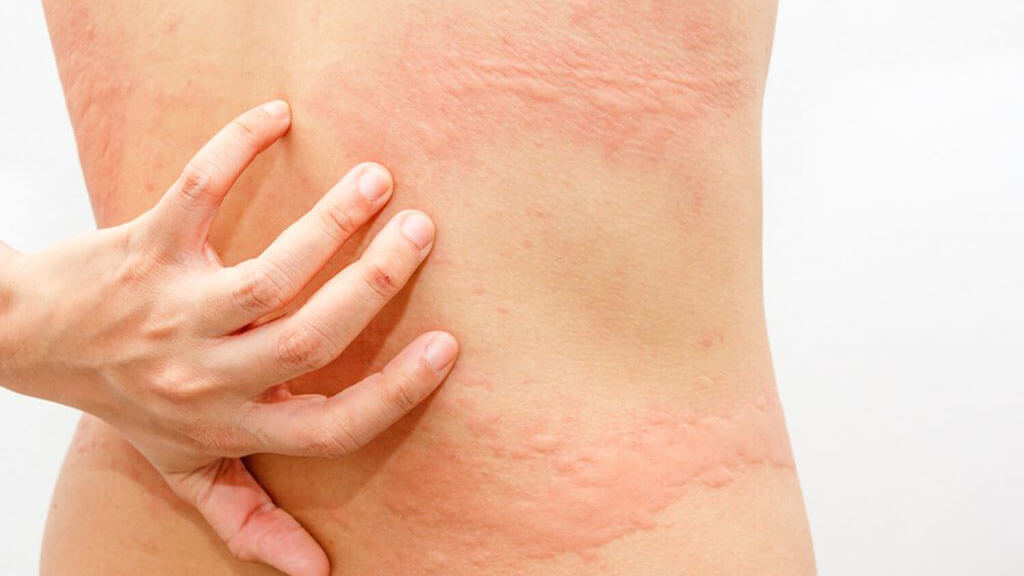
Contact dermatitis is an itchy rash caused by direct contact with a substance or an allergic reaction to it. The rash isn’t contagious, but it can be very uncomfortable. Many substances can cause this reaction such as cosmetics fragrances, jewelry, and plants. The rash often shows up within a day of exposure.
Treatment
To treat contact dermatitis successfully you need to identify and avoid the cause of your reaction. If you avoid the substances causing the reaction the rash often clears up in 2 to 4 weeks. You can try soothing your skin with a cool. Wet cloth, and other self-care steps.
- Avoid irritation or allergens.
- The key to this is identifying what’s causing your rash and
staying. - Apply an anti-itch cream or ointment.
- Take an anti-itch drug.
- Apply cool, wet compresses.
- Protect your skin.
- Soak in a soothing cool bath.
- Protect your hand.
1. Contact Dermatitis Scalp
It is also known as an irritant or allergic dermatitis or contact eczema and is caused by the skin reacting to something external that it is or has been in contact with. Contact dermatitis on the scalp is caused by a reaction to the chemical in some shampoos, hairstyles, or other hair grooming products.
2. Contact Dermatitis: Facts about skin rashes
Contact dermatitis is a rash that crops up on your skin when you touch or have a reaction to a certain substance. It’s red itchy and uncomfortable but it’s not life-threatening. The rash could be caused by an allergy or because the protective layer of your skin got damaged. Other names included allergic contact dermatitis and irritant contact dermatitis.
Symptoms
You will notice your skin may be:
- Red
- Itchy
- Dry, cracked, or scaly
- Covered in bumps or blisters. Blistering is rare. If you see a blister, contact your doctor
- Swollen
- Burning
- Tender
Irritant contact dermatitis tends to burn and be more painful and itchy. When something is irritating or damaging your skin you will probably see a rash right away. With an allergy, it may be a day or two before the rash shows up.
Treatment:
- Steroids creams or ointment. These are applied to the skin to help soothe the rash.
- Pills; in severe cases, your health care providers may prescribe pills you take by mouth to reduce swelling, relieve itching or fight a bacterial infection.
3. Contact dermatitis blisters
It is caused by the skin becoming itchy blistered dry and cracked. Lighter skin can become red, and darker skin can become dark brown purple, or grey. This reaction usually occurs within a few hours or days of exposure to an irritant or allergen.
To reduce itching and soothe inflamed skin, try these self-care approaches:
- Avoid the irritant or allergens
- Apply an anti-itch cream
- Take an ointment
- Protect your skin
- Protect your hands
- Soak in a soothing cool bath
4. Contacts dermatitis on the face
Lighter skin can become red, and darker skin can become dark brown purple, or grey. This reaction usually occurs within a few hours or days of exposure to an irritant or allergen. Symptoms can affect any part of the body but most commonly the hands and face. Apply bland petroleum jelly like Vaseline to soothe the area. Try using anti-itch treatment such as calamine lotion or hydrocortisone cream.
If needed take an antihistamine drug such as diphenhydramine to cut down itching and reduce your allergic response. You can purchase these items at most drugstores or online. Most times contact dermatitis can’t cause concern. However, you should seek medical attention if your rash is close to your eyes or mouth cover a large area of your body, or doesn’t improve with home treatment. Your doctor prescribes a more potent steroid cream for home treatment don’t soothe your skin. Treatment for contact dermatitis.
5. Home Remedies to Treat Eczema
Most cases of contact dermatitis go away on their own once the substances in no longer in contact with
the skin.
Here are some tips you can try at home:
- Avoid scratching your irritated skin.
- Scratching can make the irritation worse or even cause a skin infection that requires antibiotics.
- Clean your skin with mild soap and lukewarm water to remove any irritants.
- Stop using any product you think might be causing the problem.
- Apply bland petroleum jelly like Vaseline to soothe the area.







